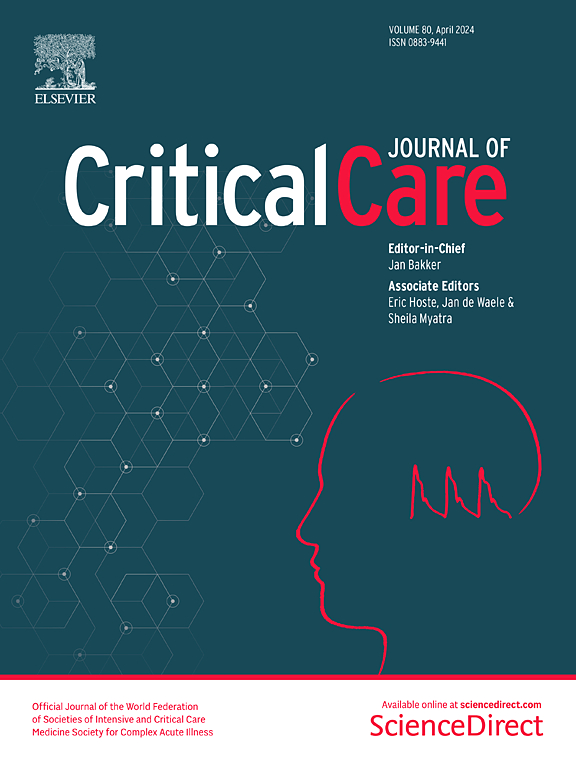Resistance training and β-hydroxy-β-methylbutyrate for functional recovery in critical illness: a multicenter 2 × 2 factorial randomized trial
IF 9.3
1区 医学
Q1 CRITICAL CARE MEDICINE
引用次数: 0
Abstract
Combined nutrition and rehabilitation is a top research priority for ICU-acquired weakness, yet the optimal strategy and clinical benefits remain unclear. This study aimed to evaluate the independent and combined effects of resistance training (RT) and β-hydroxy-β-methylbutyrate (HMB) in critically ill adults. We conducted a multicenter, open-label, 2 × 2 factorial randomized controlled trial with blinded outcome assessment in 266 adult ICU patients. Participants were randomized to receive RT, HMB supplementation, combined interventions, or standard care. Treatments began in the ICU and continued until discharge. Primary outcomes at discharge included six-minute walk distance (6MWD) and the Short Physical Performance Battery (SPPB). Secondary outcomes included muscle strength and mass, patient-reported outcomes, and mortality at 1, 6, and 12 months. Analyses followed the intention-to-treat principle, using linear mixed-effects models to estimate the independent and interactive effects of RT and HMB. RT significantly improved physical function at discharge, with higher SPPB scores (mean difference:1.32 points; P = 0.003) and longer 6MWD (56.20 m; P < 0.001), compared with patients who did not receive RT. It was associated with lower 6-month (OR, 0.51; P = 0.011) and 12-month mortality (OR, 0.55; P = 0.014), and increased grip strength (3.19 kg; P = 0.008), appendicular skeletal muscle mass (0.997 kg; P = 0.005), and skeletal muscle index (0.428 kg/m²; P = 0.025). RT reduced fatigue and improved sleep quality and psychological symptoms (P < 0.05), but had no effect on cognition or overall quality of life. HMB modestly increased phase angle (0.367; P = 0.020) and reduced fatigue (–1.069 points, P = 0.005), but had no effect on other outcomes; hyperglycemia occurred in 3 of 134 patients receiving HMB. No interaction between RT and HMB was detected. This expanded trial provides novel evidence that RT not only improves physical function but also increases muscle mass, enhances patient-reported outcomes, and lowers 6- and 12-month mortality in critically ill patients. HMB supplementation offered only modest effects on phase angle and fatigue, with no synergistic benefit when combined with RT. ChiCTR2200057685 ( https://www.chictr.org.cn/ ) was registered on March 15th, 2022.抗阻训练和β-羟基-β-丁酸甲酯对危重症患者功能恢复的作用:一项多中心2 × 2因子随机试验
结合营养和康复是icu获得性虚弱的首要研究重点,但最佳策略和临床效益尚不清楚。本研究旨在评价抗阻训练(RT)和β-羟基-β-甲基丁酸盐(HMB)在危重症成人中的独立和联合作用。我们对266例成人ICU患者进行了一项多中心、开放标签、2 × 2因子随机对照试验,并进行了盲法结局评估。参与者随机接受放疗、HMB补充、联合干预或标准治疗。治疗从ICU开始,一直持续到出院。放电时的主要结果包括6分钟步行距离(6MWD)和短物理性能电池(SPPB)。次要结局包括肌肉力量和质量、患者报告的结局以及1、6和12个月的死亡率。分析遵循意向治疗原则,使用线性混合效应模型来估计RT和HMB的独立效应和交互效应。RT显著提高物理函数在放电,具有较高SPPB评分(平均差:1.32分;P = 0.003)和长6随钻测量(56.20 m; P < 0.001),与患者没有收到RT,这是降低6个月(OR, 0.51; P = 0.011)和12个月的死亡率(OR, 0.55; P = 0.014),并增加握力(3.19公斤;P = 0.008),四肢的骨骼肌肉(0.997公斤;P = 0.005)和骨骼肌指数(0.428公斤/ m²;P = 0.025)。RT减轻了疲劳,改善了睡眠质量和心理症状(P < 0.05),但对认知和整体生活质量没有影响。HMB适度增加相位角(0.367,P = 0.020)和降低疲劳(-1.069点,P = 0.005),但对其他结局无影响;接受HMB治疗的134例患者中有3例出现高血糖。RT与HMB无相互作用。这项扩大的试验提供了新的证据,证明RT不仅可以改善身体功能,还可以增加肌肉质量,提高患者报告的结果,并降低危重患者6个月和12个月的死亡率。HMB补充剂仅对相位角和疲劳有适度的影响,与rt联合使用时没有协同效益。ChiCTR2200057685 (https://www.chictr.org.cn/)于2022年3月15日注册。
本文章由计算机程序翻译,如有差异,请以英文原文为准。
求助全文
约1分钟内获得全文
求助全文
来源期刊

Critical Care
医学-危重病医学
CiteScore
20.60
自引率
3.30%
发文量
348
审稿时长
1.5 months
期刊介绍:
Critical Care is an esteemed international medical journal that undergoes a rigorous peer-review process to maintain its high quality standards. Its primary objective is to enhance the healthcare services offered to critically ill patients. To achieve this, the journal focuses on gathering, exchanging, disseminating, and endorsing evidence-based information that is highly relevant to intensivists. By doing so, Critical Care seeks to provide a thorough and inclusive examination of the intensive care field.
 求助内容:
求助内容: 应助结果提醒方式:
应助结果提醒方式:


